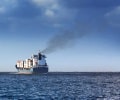IUMI calls for industry-wide cooperation and knowledge sharing as shipowners move toward net-zero

The recently revised greenhouse gas (GHG) reduction strategy adopted by the International Maritime Organization’s (IMO) Marine Environment Protection Committee (MEPC) in July is fully supported by the International Union of Marine Insurance (IUMI). The new strategy calls for shipping to achieve net-zero GHG emissions around 2050 with at least a 20% reduction by 2030 and at least a 70% reduction by 2040 (from a 2008 baseline).
Marine underwriters will play a pivotal role in the pursuit of net-zero as new technologies give rise to new risks which will need to be understood and insured. This will require full industry cooperation as Helle Hammer, Chair or IUMI’s Policy Forum explains:
“Compliance with this ambitious new strategy will fall mainly on the shoulders of the shipowners but they will be fully supported by the marine insurance community who will underwrite much of the risk. Therefore, there needs to be comprehensive cooperation and knowledge sharing between owners, class, flag states, underwriters and others. This will be particularly important as the first movers begin implementing new technologies which will then, inevitably, be taken up by the remainder of the industry. It will be essential for a comprehensive regulatory regime to be in place before the bulk of the fleet starts to comply.”
Work on creating a safety roadmap is already underway at IMO which will identify the challenges and discuss potential solutions. IUMI co-sponsored this initiative – which was spearheaded by the International Association of Classification Societies (IACS) – and will be involved in its continuing development. Guidelines for the safe use of ammonia and hydrogen as propulsion technologies have already been published and most class societies have issued a range of relevant notations. However, it will be important for holistic regulations to be in place which must also place a heavy emphasis on crew safety.
Helle Hammer continues:
“Protecting the environment is essential but so is protecting the welfare and safety of our seafarers. We should ensure that environmental and crew safety initiatives are progressed simultaneously to ensure those at sea are not compromised in any way. At the same time, we need to recognise that significant and new training programmes will need to be implemented to ensure our seafarers are fully trained and compliant with the new technologies and can operate them safely.”
A central role for IUMI is to ensure that marine underwriters are aware of and engaged with the evolution of the shipping industry. An opportunity to raise and debate these issues is currently underway at the IUMI annual conference in Edinburgh where this, and other topical issues, feature on the agenda.
Helle Hamer concludes:
“We will face many challenges and unknowns as we move to net-zero and, as an industry, we must work together to ensure people are kept safe and the environment is protected. New risks must be understood, insured and mitigated; and underwriters are likely to seek more information outside their loss records as a result.”
Source: International Union of Marine Insurance

